Playing Cards and Decans: Cancer II — The Three of Hearts
See the master post on my 2024 decan walk and playing cards
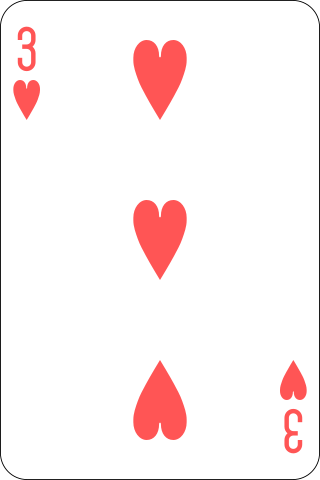 Three of Hearts
Three of Hearts
Cancer II is the decan of Cancer 10° to 19° (inclusive). Astrologically, it is ruled by Mercury, in a sign ruled by the Moon.
The traditional English method divinatory meanings for this card are:
- A kiss.
- Poverty, shame and sorrow, caused by imprudence. A card of caution.
- shows that your own imprudence will greatly contribute to your experiencing the ill will of others.
- Sorrow caused by your own indiscretion.
- Sorrow caused by a person’s own imprudence.
Reflection
We start with a kiss. Moving from Cancer I to Cancer II changes Venus to Mercury, and we begin to flitter back and forth, with the querent in some way causing their own sorrows through ‘imprudence’. The indication of a kiss in the first source here gets right to the point: this is potentially a card of the querent (not the querent’s partner!) being unfaithful in a monogamous situation. This may be metaphorical, in the case of questions about business or other situations, but the pleasure is transmuted by cerebral Mercury into sorrows.
Agrippa’s image remains optimistic, with some rather nice concrete magical purposes for this decan:
in the second face ascendeth a man cloathed in comely apparrel, or a man and woman sitting at the table and playing; it bestoweth riches, mirth, gladness, and the love of women
This is a binaristic reversal of Cancer I, which featured a woman and was good for ‘the love of men’, although one of the options for the image being both a man and a woman begins to slide Mercury back into the picture. The Rider-Waite card displays this forthright:
 Three of Cups
Three of Cups
A card of celebration, and generally a very positive card to draw in Tarot, this is also a card of three people. If they are all agreeing and happy to be there, fantastic. If not, then problems will arise — to say the least.
One way to work with the movements of this card is to resolve it in a Mercurial fashion: communication with the other people in the situatoin.
Peace,
⭕
Playing Cards and Decans: Cancer I — The Two of Hearts
See the master post on my 2024 decan walk and playing cards
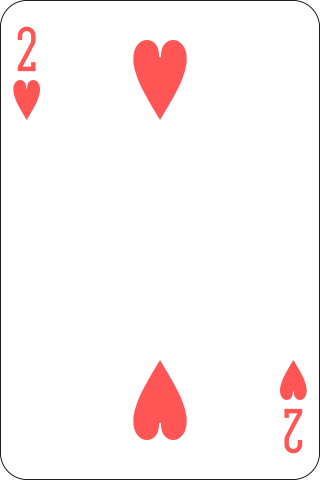 Two of Hearts
Two of Hearts
Cancer I is the decan of Cancer 0° to 9° (inclusive). Astrologically, it is ruled by Venus, in a sign ruled by the Moon.
The traditional English method divinatory meanings for this card are:
- Success in life, position in society, and a happy marriage, attained by virtuous discretion.
- shows that extraordinary success and good fortune will attend this person; though if unfavourable cards attend, this will be a long time delayed.
- Success, but it will need care.
- Great success, but equal care and attention needed to secure it.
Reflection
Well, we made it to Cancer, thus completing a quarter of the decans so far!
We are also into the Hearts, arguably the most straightforwardly positive suit in the playing card system — although individual cards may challenge that, as we will see in later decans.
Cancer I, the Two of Hearts, is a jolly card. Succes, happy marriage, with the need for ‘virtuous discretion’. This is all good news, but there is a need for continual work to maintain these successes. The success needs ‘care’ and comes about through discretion, it is not simply a gift from above. Agrippa’s image for this decan is charmingly Venus:
In the first face of Cancer ascendeth the form of a young Virgin, adorned with fine cloathes [clothes], and having a Crown on her head; it giveth acuteness of senses, subtilty of wit, and the love of men
Note that the love of ‘men’ seems specific, as Cancer II’s image specifies the love of ‘women’.
Connecting this card to the astrological symbolism seems quite simple: the benefic Venus is in the moist and cold sign of Cancer, protected by the Moon, although the Moon gives movement and change that means that care is required. Cancer’s pop astrology stereotypes emerges through, with the lunar aspect being a requirement of the querent here: it is not so much that the marriage will be “caring” (although that is certainly a possibility), but that it will require care.
I think this is partly why this is a card of success in the first place. All such relationships and goods require care and attention to secure and maintain. This card’s reminders at the end tell the querent that they need to not simply take such good news for granted.
The Rider-Waite image for this decan is also quite straightforward, although it doesn’t necessarily contain the full implication of care and attention being required to continue the goodness that is flourishing in this card. I want to end with this, as a positive micro-talisman:
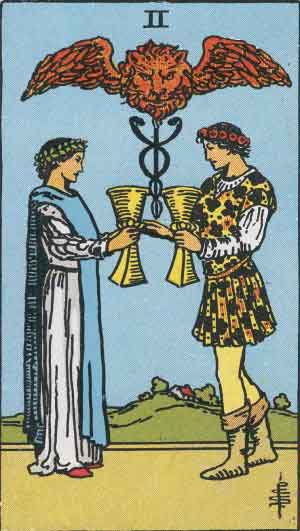 Two of Cups
Two of Cups
Peace,
⭕
Playing Cards and Decans: Gemini III — The Ten of Spades
See the master post on my 2024 decan walk and playing cards
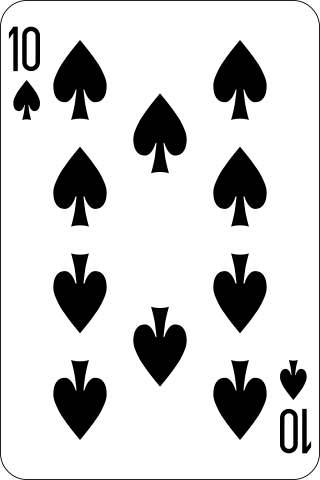 Ten of Spades
Ten of Spades
Gemini III is the decan of Gemini 20° to 29° (inclusive). Astrologically, it is ruled by the Sun, in a sign ruled by Mercury.
The traditional English method divinatory meanings for this card are:
- Sickness.
- Disgrace: crime: imprisonment. Death on the scaffold. A card of caution.
- is a card of bad import; it will, in a great measure, counteract the good effects of the cards near you.
- Grief and trouble.
- Grief, imprisonment.
Reflection
Unlike sickness in the previous card, this card indicates grief more overtly, with the possibility of being restrained or contained (although as the first source indicates, sickness is related to this). The Sun in this decan shines a lights on the back-and-forth movements of Mercury, apparent in Agrippa’s image for this face:
In the third, ascendeth a man seeking for Arms, and a fool holding in the right hand a Bird, and in his left a pipe, and they are the significations of forgetfulness, wrath, boldness, jeasts [jests], scurrilities, and unprofitable words
The symbolism of the Sun in this decan is perhaps best understood through the idea of combustion: When a planet is too close to the Sun, it becomes literally invisible to the naked eye, and is considered to be burnt up and significantly less capable of undertaking what it wants to do. Such disappearance is indicated in one literal format with imprisonment in the delineation, but grief and crime come through in the archetype here — things that take place when no-one can see. Agrippa’s mention of forgetfulness follows this out-of-side delineation, with ‘unprofitable words’ reflecting what this could become in the Mercurial realm.
The Rider-Waite is not subtle about this.
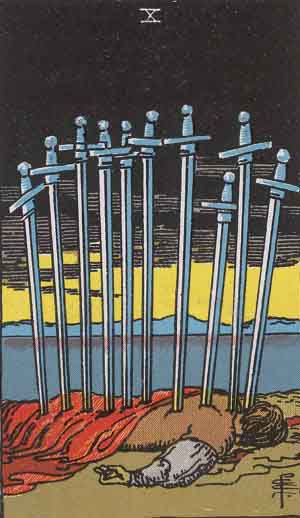 Ten of Swords
Ten of Swords
The “upside” to this card is, essentially, this is the end of whatever cycle this is (which, in almost all cases, is not actually grief or physical restraint). The sword/spade cards have been introduced to the zodiac through the highest numbered cards of the suit — the most extreme indicates are done early. The culmination of the spades journey has been reached, and yes, it sucks, but the problems are now in the past — the present is a case of rebuilding, healing, and deciding where to go next to find a new, productive path.
Peace,
⭕
Playing Cards and Decans: Gemini II — The Nine of Spades
See the master post on my 2024 decan walk and playing cards
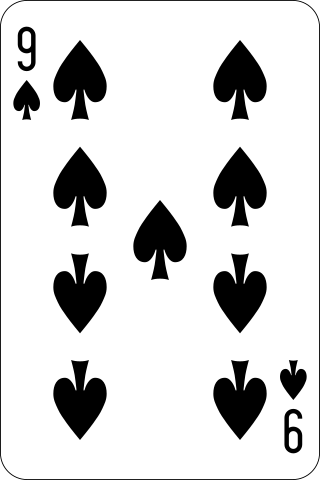 Nine of Spades
Nine of Spades
Gemini II is the decan of Gemini 10° to 19° (inclusive). Astrologically, it is ruled by Mars, in a sign ruled by Mercury.
The traditional English method divinatory meanings for this card are:
- A disappointment.
- Grief: ruin: sickness: death
- is the worst card in the whole pack; it portends dangerous sickness, a total loss of fortune, cruel calamities, and endless dissentions in your family.
- Sickness and misfortune, a most unlucky card.
- A card of very bad import, foretelling sickness and misfortune.
Reflection
I’m writing this shortly after the Sun has ingressed into Cancer — getting too caught up during Gemini season and then having to write two blog posts at once is very Gemini!
Oh, joy, the first spades card that’s ruled by a malefic. It can feel like this card is just a general warning of doom, but closer inspection of the delineations indicates it refers primarily to sickness, with grief and general ‘misfortune’ secondary. Mars — inflammation and heat — is poking at the body, with Gemini indicating the shoulders, with the nervous system a secondary indication. The Martial inversion of one common idiom would be here having swords in your shoulders, embedded and poked.
Agrippa’s image for the face is curious to say the least:
in the second face ascendeth a man in whose hand is a Pipe, and another being bowed down, digging the earth: and they signifie infamous and dishonest agility, as that of Jesters and Juglers [jugglers]; it also signifies labours and painful searchings
Mars and Gemini as indicating jesters is an odd combination but one that “makes sense”, I have to admit. The playing cards reflect more the persons in the image, with digging into the earth a reminder of possible fourth (astrological) house connotations of death and grief. The dishonest agility here is what comes about when you try to keep up appearances during griefs and sicknesses, the fake smile for the sake of others that can just make things worse.
The Rider-Waite Tarot is just as “fun”:
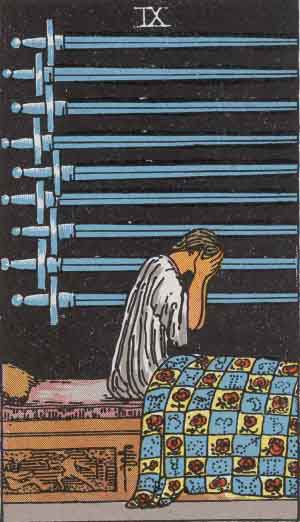 Nine of Swords
Nine of Swords
My reading of this has always been one awake at night. In Tarot, the swords suit is often related to thoughts (via associations with the element of air). Thinking is a hard habit to quit, and probably the greatest cause of insomnia. The Martial stabs are felt in this card, in a way implied to be more psychological than in the playing card associations — such awake-at-night is a symptom of what the playing card indicates, and likely not the cause.
Put on some relaxing rain sounds and try and get some sleep.
Peace,
⭕
Playing Cards and Decans: Gemini I — The Eight of Spades
See the master post on my 2024 decan walk and playing cards
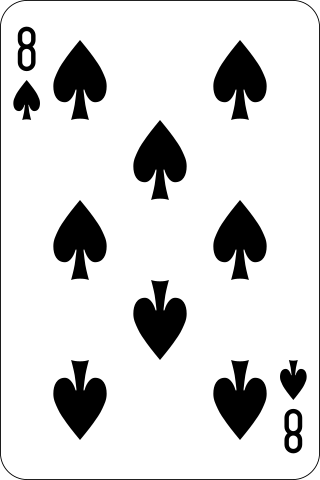 Eight of Spades
Eight of Spades
Gemini I is the decan of Gemini 0° to 9° (inclusive). Astrologically, it is ruled by Jupiter, in a sign ruled by Mercury.
The traditional English method divinatory meanings for this card are:
- A road way.
- Great danger from imprudence. A card of caution.
- shows that you will experience strong opposition from your friends, or whom you imagine to be such; if this card comes close to you, abandon your enterprise, and pursue another plan.
- A warning to be careful.
- Warns a person to be cautious in his undertakings.
Reflection
We’re now into the spades — generally seen as the most negative suit in playing cards divination. The use of “spades” comes not from the farming implement, but the Old Spanish “spado” for sword, and in French the suit is called “pique” after the pike, a now-obscure medieval weapon. Ouch.
The astrology, however, seems more upbeat. We’re in the realm of Mercury, communication, translation, and movement. The three air signs — Gemini, Libra, and Aquarius — are ruled by Mercury, Venus, and Saturn, respectively, and Mercury can feel the most “airy” of the three. Bringing in the greater benefic of Jupiter would explain why Agrippa’s image for the face is rather positive:
In the first face of Gemini ascendeth a man in whose hand is a rod, and he is, as it were, serving another; it granteth wisdom, and the knowledge of numbers and arts in which there is no profit
Wisdom, and particularly around numbers and arts, feels very Jupiter-Mercury. The interesting part is that he is granting wisdom for that “in which there is no profit”. This is where the playing card’s delineations start to make sense with the decans’. Jupiter’s expansiveness can cause Mercury to spread too far, chasing down rabbit holes and getting into seemingly endless cycles that, while productive in themselves, lead to “no profit” outside of them. Knowledge for knowledge’s sake is one of the powers of Gemini I, but applying that knowledge can be difficult.
Our oldest source (1), Breslaw’s 1784 The Art of Fortune-Telling by Cards, simply says “A road way”. The spiritual metaphors drawn from the image of “the road” are many, so I won’t rehash that ground here — but as a general principle, the Jupiterian, cosmic aspect of “the road” as spiritual path (rather than just the Mercurial-Lunar travelling side) should be borne in mind throughout all of these delineations.
The other sources list more classical spades-swords-y problems. A general card of caution in two of the sources, Mother Bridget (3) is more specific: abandon your enterprise, pursue another plan — the road is going the wrong way — and a warning that you will experience opposition from your friends.
Friends will, generally, try to get their friends to not go down the wrong road. This card indicates engaging in extensive projects that will bring no fruits, and the card invokes friends: listen to what others are saying, there are other signs telling you that this is not a productive route. It is not that the friends are necessarily on your side — Mother Bridget does write that they may be those who “you imagine to be” your friends. Yet the opposition they present to the enterprise represents a core flaw with the road at hand.
Let’s look at the Rider-Waite tarot:
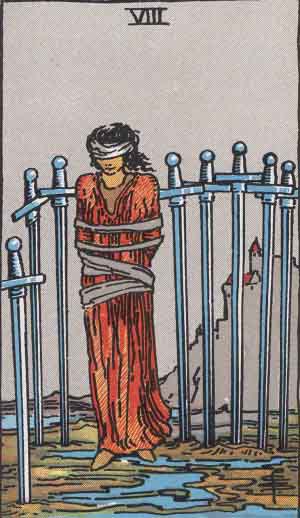 Eight of Swords
Eight of Swords
I know of multiple people who have said that this is one of their favourite cards, despite the stark imagery. Like many swords cards, this card is actually, kind of, chill. It is someone immobilised — perhaps by the Jupiter-Mercury overwhelm discussed above. Untangling this mess can be slow, and in more concrete predictive questions, the implications of this card can be similar to those of the playing card. Be cautious, abandon the enterprise. As much as this is far from the worst situation to be in, its not one you would intentionally try and get into. This playing card is a warning to focus on knowledge in which there is profit.
Peace,
⭕
Playing Cards and Decans: Taurus III — The Seven of Diamonds
See the master post on my 2024 decan walk and playing cards
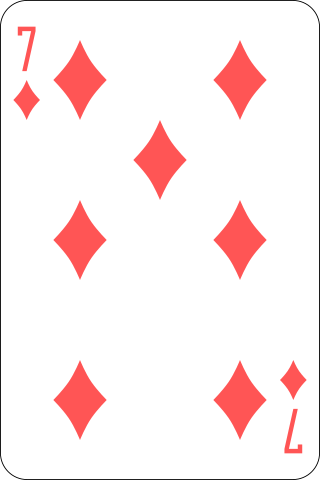 Seven of Diamonds
Seven of Diamonds
Taurus III is the decan of Taurus 20° to 29° (inclusive). It is ruled by Saturn.
The traditional English method divinatory meanings for this card are:
- Satire. Scandal. Unpleasant business matters.
- denotes that you will be troubled by the infidelity of your conjugal partner, or lover, and loss of property.
- Unpleasant rumours, scandal.
- Satire, evil speaking.
Reflection
We made it to the end of Taurus! The first sign of this decan walk is complete. A series of negative delineations are in the sources, matching the classic malefic nature of Saturn (sect of your natal chart aside, yada yada). The playing card meanings cover a few different topics — but 2, 4, and 5 focus on ‘evil speaking’ (including satire!), with infidelity and loss of property mentioned by 3.
The image of the decan given by Agrippa is equally morose:
in the third face, ascendeth a man in whose hand is a Serpent, and a dart, and is the image of necessity and profit, and also of misery & slavery.
The holding of a serpent brings to mind the snake card in Lenormand. Mary Hawkins writes that the snake ‘warns you “something is up,” likely in an unpleasant sort of way’ and that generally it ‘symbolizes deceit, betrayal, and complications, particularly in a relationship reading’. The serpent imagery matches with this card extremely well. The undercurrent of infidelity is also worth pointing out, in relation to the theme of speech — to be troubled by infidelity, you need to know that it’s happening (or suspect that it’s happening). While there are many ways of discovering this, either being told directly or hearing rumours are likely candidates.
This flows with the astrological imagery when returning to the base association of Taurus with the throat. Taurus III is Saturn caught in the throat, an unpleasant lump caught in the throat, a symptom of anxiety so common it has its own latin term — globus hystericus.
Let’s look at the Rider-Waite tarot:
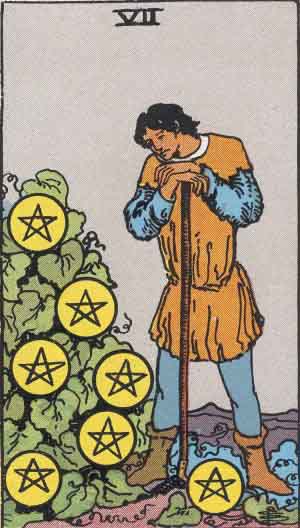 Seven of Pentacles
Seven of Pentacles
This image is comparatively calm. A. E. White’s Pictoral Key to the Tarot says of the figure looking at the bushes that ‘one would say that these were his treasures and that his heart was there’. White brings in the speech-related imagery of this card in his delineation:
Divinatory Meanings: These are exceedingly contradictory; in the main, it is a card of money, business, barter; but one reading gives altercation, quarrels—and another innocence, ingenuity, purgation. Reversed: Cause for anxiety regarding money which it may be proposed to lend.
Money is the classic concern of pentacles, and the full shrub certainly lends a positive omen for money (this is also reflected in the ‘necessity and profit’ part of Agrippa’s decan image). I interpret the quarrels and altercations it can lead to as a possible outcome of those blossoming pentacles. When one’s heart is entirely in the pentacles, everything else can be left behind — leading to quarrels, confusion, rumours, and infidelity. The playing cards simply skip the phase of attachment to money, and highlight one possible ending to that story. When gazing at your blossoms, remember the garden around you.
Peace,
⭕